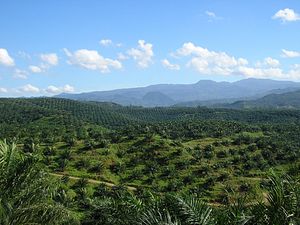With new regulatory changes now taking place on the basis of the EU’s Renewable Energy Directive (RED) II of 2018, Indonesia and Malaysia are trying to come to terms with the implications for their global palm oil market strategy and domestic production. They are mobilizing intra-regional support from ASEAN and its members and even considering bringing their case forward to the WTO. The prospect of a considerable dip in palm oil exports to the European Union has become very real.
And in light of contemporary global efforts to fight climate change and European discourse linking deforestation and high emission levels of carbon dioxide to palm oil plantations in Southeast Asia, there are fears among Southeast Asian growers and other stakeholders that the lower export volumes to the European Union will remain.
Two decades ago, this decline of palm oil imports was unforeseeable. In the 1990s and early 2000s, there was growing interest in sustainable energy and the advancement of the European Union as a low-carbon economic zone. The European Commission treated palm oil imported from Southeast Asia as an essential part of its environmental risk and climate change mitigation strategy rather than a hindrance to global efforts to protect the environment and combat climate change.
This pro-palm oil perspective was visible in the making of the EU’s RED I, which came into force in 2009. RED I spelled out a range of incentives for palm oil countries exporting to the European Union and opened the EU market for more biofuel imports. To Southeast Asian growers, the subsidies and tax relief — if sustainability criteria were met — assisted the expansion of production and exports.
At the same time, the European Commission’s oversight of imports enhanced through RED I and enabled greater structuration of trade flows and improved identification of issues of malpractice. The European Commission was in a more informed position to initiate and pursue anti-dumping investigations and court cases against palm oil producers from Southeast Asia. Interestingly, paralleling these technical developments was a growing intra-EU resentment towards the European Commission. Stakeholders, including civil society, European smallholders of sustainable oil crops and the European Biodiesel Board, directed their anger at the European Commission.
This discontent compelled the European Commission to be effectively more vigilant about palm oil imports. Amendments were made to anti-dumping regulations and procedures were launched, including procedures against Indonesia and Malaysia as well as traders in Singapore. The court cases made it clear to outside audiences that the European Commission was in a difficult position. Its interest in sustainable palm oil from outside of the European Union was incompatible with the interests of national governments and European oil crop growers and their lobby groups.
To find an adequate balance between domestic and global trade rationales, the European Commission continued forestalling unilateral attempts of member state governments by proposing and making changes to legislation, for example, by amending the sustainability criteria connected to RED I. In this context of the amendments to RED I, it was the European Parliament in particular who exerted pressure on the European Commission to phase out food crop biofuel imports. Although accustomed to anti-dumping actions in connection to palm oil and aware that the output of the European Parliament was legally non-binding for the European Commission, Indonesian and Malaysian authorities were outraged in 2017 when the European Parliament demanded an eventual ban of palm oil.
This forced the European External Action Service (EEAS) delegations in Indonesia and Malaysia to distance themselves from the European Parliament’s position and underline their commitment to the global free trade rules of the World Trade Organization (WTO). At the intra-EU level, the European Commission saw the urgency to act and sought the trilogue procedure to review the European Parliament’s demands for RED II. The trilogue on 14 June 2018 between the Council, Commission and European Parliament led to the acceptance of a revised RED II at the end of 2018.
In 2020, RED II is in effect and acting as a basis for various regulation changes, including changes to the Commission Delegated Regulation EU 2019/807 of 13 March 2019 concerning indirect land use change (ILUC) and setting criteria for low ILUC-risk biofuel. Within EU–ASEAN member state diplomacy, these and other RED II changes impacting palm oil imports and sustainability criteria have created new bilateral bargaining realities, especially for those Southeast Asian palm oil-exporting countries in ongoing free trade agreement (FTA) talks with the European Union. These FTA talks could see, for example, more generally, adjustments to the political quality of the content of the agreements — ideally still to be kept at a minimum in an FTA — and the use of political issues as bargaining tools for the promotion of the economic agendas of the respective sides.
In light of these and other RED II-induced developments over the past twelve months, the palm oil conundrum points to difficult times ahead for EU–ASEAN diplomacy. The decision to upgrade the relationship to an EU–ASEAN inter-regional strategic partnership only in principle at the 22nd ASEAN–EU Ministerial Meeting in January 2019 in Brussels was a taste of this challenge.
Naila Maier-Knapp is a political science lecturer and researcher at the University of Rostock. She is author of Contemporary Inter-regional Dialogue and Cooperation between the EU and ASEAN on Non-traditional Security Challenges (Routledge, 2020). This piece was originally published over at East Asia Forum here.

































